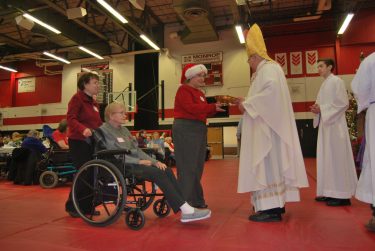Having a disability does not change a person’s value, dignity, or right to live. We provide support and education on how to respond to a prenatal diagnosis and end of life decisions.
Prenatal Diagnosis
Receiving a prenatal diagnosis can be a very scary and confusing time. There is likely to be a lot of information, which can lead to even more questions. The Apostolate is here to accompany you and your family in any way we can.
We understand that each families needs and situation are different. Ways that we can help include
- Connecting you to peer support from other families who have walked a similar journey
- Emotional and spiritual support, including chaplain and clergy referrals
- Talking through of medical terminology and suggested questions for your medical team
- Help creating a birth plan for your baby’s arrival
- Assistance arranging burial and memorial services
- Emmaus Retreats – healing retreats for those who have lost a child
Click here for an article written for the Diocese of Madison’s Human Life and Dignity Newsletter that tells the story of Omar and his family’s prenatal diagnosis journey.
Other Resources
National Catholic Partnership on Disability (NCPD)
National Catholic Bioethics Center
American Association of Pro-life OB-GYN
Based out of the Archdiocese of Dubuque, offers trainings for miscarriage and infant loss accompaniment.
CaringBridge is a confidential website allowing parents to share health information and receive support from family and friends.
End of Life Care
Pain and suffering can be hard to witness, and even harder to endure. We understand that persons with disabilities and those who are at end of life may experience both, sometimes for long periods of time or increasingly so as their illness progresses. The Apostolate is here to support caregivers and provide guidance in navigating these emotionally painful experiences, as you and your loved one’s pain and suffering is united with Christ’s pain and suffering on the cross.
The dying should be given attention and care to help them live their last moments in dignity and peace. They will be helped by the prayer of their relatives, who must see to it that the sick receive at the proper time the sacraments that prepare them to meet the living God. – CCC 2299
Latest News

Guidelines For The Celebration Of The Sacraments With Persons With Disabilities
Resources
Video
Moment with the Bishop of Madison
Learn about our faith, a few minutes a week, directly from our loving bishop!
Video
Liz Carr's message to Victoria
UK Comedian, TV star and disability activist, Liz Carr speaks to governments considering legalizing assisted suicide and euthanasia
Video
Jeanette's Story: 15 Years Later
When Jeanette Hall had less than a year to live, she asked her doctor for the pills to commit suicide. Dr. Kenneth Stevens got to know her better, inspiring her to have treatment instead.

